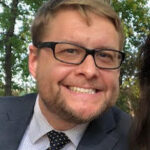“It became clear that it would be smarter and easier to [combine the states] right at the beginning, so we contacted colleagues in North and South Dakota. They expressed interest in being part of a society, so we formed a tri-state group from the start.” When the board of directors was formed, it included representatives from all three states.
Annual Meeting Program Variety
The lion’s share of planning for the annual meeting programs has been handled by Dr. Matteson and Gary L. Bryant, MD, FACP, a rheumatologist and associate professor of medicine at the University of Minnesota who also happens to chair the ACR’s delegation to the American Medical Association House of Delegates.
The society’s intent, as with the makeup of the board of directors, is to balance the meetings’ offerings, says Dr. Hargrove. Thus, in addition to inviting a nationally known keynote speaker (e.g., last October’s meeting featured Jonathan Kay, MD, speaking about biosimilars), meeting planners include topics that will appeal to members in academic and private practice settings. A balance of speakers from the Mayo Clinic and the University of Minnesota has also been a goal, with inclusion of case presentations by rheumatology fellows from both institutions. Speakers from private practice will also be included when available.
Eye on the Horizon
Now, with two successful annual meetings under its belt, the society can look to future challenges and opportunities. Dr. Hargrove would like to see more emphasis on advocacy and plans to form an advocacy committee that will, with guidance from the ACR’s Affiliate Society Council, consider which issues to address. “Hopefully, experiences in one state will be helpful in the others, because each state may be dealing with such issues as biosimilar legislation or step therapy at different times,” she notes.
Another goal for the society is to foster mentorship programs, targeting trainees even earlier than at the fellowship stage. Dr. Hargrove believes it’s important to start early with encouraging the rheumatology choice, “so that we can continue to have people in medicine who realize that rheumatology is exciting and changing, and we can continue to have as many rheumatologists as possible in the pipeline.”
Gretchen Henkel is an award-winning health and medical journalist based in California.


